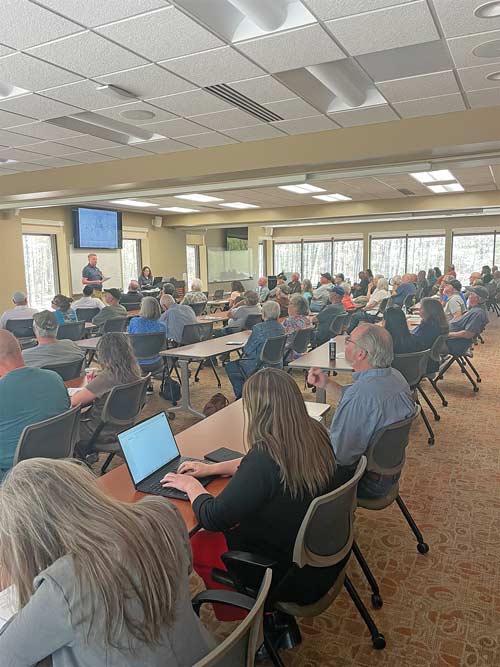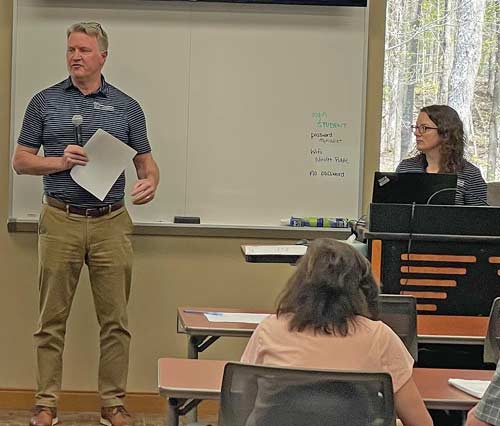May 16, 2025 at 5:55 a.m.
Rhinelander water woes outlined at public information meeting for proposed well at Nicolet College
A public information meeting at Nicolet College Monday was attended by nearly 70 people, the topic a proposed municipal water well for the city of Rhinelander that would be built on property of Nicolet College, which is in the town of Pelican.
Monday’s nearly two-hour meeting in the college’s Northwoods building was a city meeting, facilitated by Greg Droessler and Amy Bares of Town & Country Engineering, the firm hired by the city to develop an engineering plan for the well.
“If something happens to the
well, what are the plans?”
Nick Scholtes,
Pelican town chairman
The meeting, along with another public information Nicolet College administration will be conducting on May 20, was prompted by concerns residents of the town of Pelican had expressed during town board meetings on April 23 and March 5.
Among the concerns, along with any potential impact a new well might have on water levels on lakes and private wells in Pelican, was that of several people, including town chairman Nick Scholtes, first hearing about the proposed project shortly before the April 23 town board meeting.
At the May 5 town board meeting, Scholtes told those in attendance he’d visited with Rhinelander city administrator Patrick Reagan and provided more background into the reasons the city is looking at a possible water well at Nicolet College.
He said Reagan explained the city is “struggling to keep up with water demand” due to the shut down of two city wells in 2019 because of PFAS contamination.
“He said the shortage of supply has been getting kicked down the road for 10 years,” Scholtes said at the May 5 town board meeting. “They stated the city is at a critical junction right now. Due to the shortage, they haven’t been able to do their hydro-flushing for the past five years and if any other wells go down, it’s going to be a crisis. I told them it was extremely important that they conduct an open meeting for the public so the public can ask questions.”
 Approximately 65 people, many of them residents of the town of Pelican, attended a public information meeting conducted by the city of Rhinelander at Nicolet College on Monday, May 12. The subject of the meeting was a proposed city well on college property. The college is in the town of Pelican.
Approximately 65 people, many of them residents of the town of Pelican, attended a public information meeting conducted by the city of Rhinelander at Nicolet College on Monday, May 12. The subject of the meeting was a proposed city well on college property. The college is in the town of Pelican.
(Photo by Brian Jopek/Lakeland Times)Scholtes said he was informed by city staff even if the two city wells closed in 2019 were treated and reopened, the city of Rhinelander would still need another water source “which surprised me.”
Also at that May 5 meeting was Town & Country’s Mark Barden, who answered what questions he could and indicated he would try to have representatives with the Wisconsin Department of Natural Resources (DNR) at the May 12 public information meeting.
Treatment not cheap
Droessler began Monday’s public information meeting by saying he and Bares would do a “15 to 20 minute overview” and then open the meeting for questions and other input related to the proposed well project.
“We are going to try to answer as many of those questions as we can today but there may be some we simply don’t have answers for and we’ll answer those separately,” he said.
In his overview, Droessler explained the city of Rhinelander has three active wells “that serve the entire city as well as about 115 customers in the town of Pelican and the town of Crescent and including Nicolet College here.”
“The city extended service to Nicolet College back in 1999 or 2000, somewhere along that period, to serve the college’s water needs,” he said. “That averages somewhere in the 20,000 to 30,000 gallons a day usage out here. They have fire protection training, they teach classes out here. They use city water as part of that.”
In addition, Droessler said the city of Rhinelander provides fire protection to local towns.
“The town are able to come to the city system, connect to those hydrants and use that water for fire protection,” he said. “It’s not just the city ... working with the local towns not only for fire protection but honestly, for water needs on an everyday basis for those folks.”
 Greg Droessler, vice-president of water and wastewater services with Town & Country Engineering, and Amy Bares, technical lead for the firm’s water department, took the lead and addressed questions posed by members of the audience during a public information meeting conducted by the city of Rhinelander at Nicolet College on Monday, May 12.
Greg Droessler, vice-president of water and wastewater services with Town & Country Engineering, and Amy Bares, technical lead for the firm’s water department, took the lead and addressed questions posed by members of the audience during a public information meeting conducted by the city of Rhinelander at Nicolet College on Monday, May 12.(Photo by Brian Jopek/Lakeland Times)
Droessler said Rhinelander has three water towers that store “about 1.2 million gallons a day.”
“There’s a also a 1.25 million gallon underground reservoir as well to store water,” he said. “That’s all intended to basically meet the DNR’s requirements for water storage, fire protection and peak day flows when there’s demand throughout the city.”
He said the two wells that were closed in 2019 are available for “emergency use only,” the first established in 2008 and the second in 2014, and still maintained by the city.
“The city’s considered treatment of those wells but we are currently waiting on some federal or state funding,” Droessler said. “Treatment, as you can imagine, is not cheap.”
The treatment options include the use of granulated activated carbon, or GAC, and an ion exchange process.
“Those are each effective ways of reducing PFAS ... probably to the levels you’d need for a municipal water service,” Droessler said. “The reason I say ‘probably’ is because we had a couple of conflicting standards.”
Those were from the DNR, the Wisconsin Department of Public Health and the federal Environmental Protection Agency.
Droessler said as part of the discussion leading up to the closure by the city of the two wells in 2019, treatment cost estimates were provided to the city.
“They were not cheap,” he said, adding the biggest “wild card” would be what to do with the PFAS after treatment.
“This is a forever chemical,” Droessler said. “You’ve all heard about it. It doesn’t just go away so we have to look at where ... it would go for disposal.”
As for the city of Rhinelander’s search for water, he said it “goes back decades” and he and Bares have been going through documents related to the topic that date to the 1980s.
“It’s amazing to think about in a community that is quite literally surrounded by water that here we are searching for sources of water,” Droessler said. “Not only in quality but in quantity. There’s been test wells dug around the city for decades, dating back to the 1970s.”
Series of issues
Later, after Droessler opened the floor to questions, among those regarding any arrangements that have been made to allow the city to put a new well on the college’s property.
“At this point, I’ve not been part of those discussions,” he said. “I know that the city has recently met with the college to discuss it. Unfortunately, that came out a little quicker than anticipated due to media coverage and we have not been able to sit down with (college administration) and have a thorough discussion about it.”
Droessler was pressed on that, the question from the audience whether he felt that should be done before the process, which would be Town & Country Engineering have a well design ready to submit to the DNR by June 30 for review.
“Admittedly, we are taking a sideways step at this because once we got involved and found there was way more to the story,” Droessler said. “We’ve had to hit the pause button before we move forward with any of those discussions.”
Bob Martini, who said he worked on water quality issues before retiring from the DNR and has been a member of the college’s board of trustees for the past 29 years, said he wanted to make it clear “this has not been negotiated yet.”
“Once the city and Nicolet College get a negotiated agreement, it then has to be on an agenda for the Nicolet board,” he said. “If the Nicolet board passes it, it goes on to the state board for their approval as well. So, there’s a significant delay between the time when the city and the college come up with a negotiated agreement ... to the time it’s implemented ... of course, we have a whole series of issues.”
Martini said there has been one session between members of city staff and college administration.
“Not in great detail,” he said. “The detailed questions have yet to come and the negotiations on those detailed questions have not been done yet. So, it’s anybody’s guess when that’s going to happen but it certainly isn’t going to happen before your June 30 deadline. It’ll be many months out before we get a negotiated agreement.”
That was something Droessler acknowledged and he also agreed with Scholtes later in the meeting when Scholtes reiterated the need for better communication on the issue between the city, the college and the town.
“A lot of the concerns of the people who live out here ... the potential for a water drawdown is what has everybody on edge,” Scholtes said. “There is no way the engineers can guarantee exactly what the drawdown is going to be just as there’s no way to tell us just how much water is in an aquifer.”
The big thing he said the residents of the town of Pelican would like is for the city of Rhinelander to “include us in on the information as far as mitigating.”
“If something happens to the well, what are the plans?” he asked and he said he understood there would be plans in place but along with that was uncertainty.
“Does that mean a new well?” Scholtes asked. “At the city’s cost? Does that mean water provided by the city at the city’s cost? If all of a sudden, these wells go dry, we’ve got people who are looking at the expense ... $20,000 plus to put in a new well. So, that is the part I think everybody is on edge with right now.”
Scholtes later told The Lakeland Times the town isn’t being told what will be done “if something doesn’t go right” as the project proceeds.
“It didn’t start out well with finding out about in the paper,” he said. “But it’s a situation now where I have been included now in the email chain and things of that nature but reading through some of the reports, it seems one and one doesn’t add up to two ... I’m not sure we’re getting everything we need to get.”
Reagan after the meeting said he felt “it went well.”
“We have some work to do,” he said.
Brian Jopek may be reached via email at [email protected].
WEATHER SPONSORED BY
E-Editions
Latest News
E-Editions
Events
August
To Submit an Event Sign in first
Today's Events
No calendar events have been scheduled for today.


Comments:
You must login to comment.